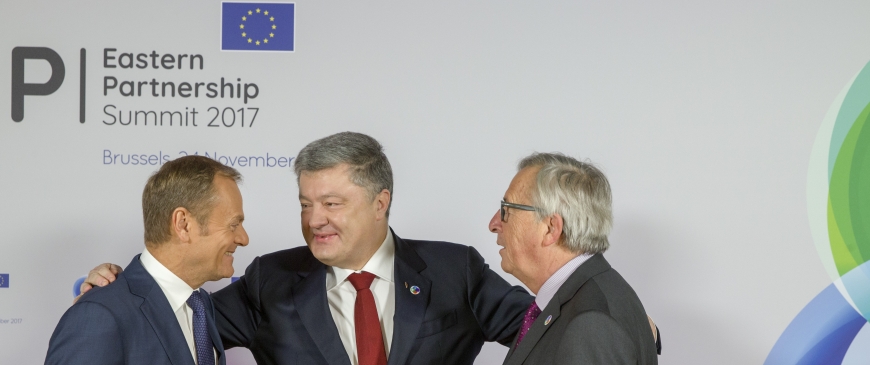
Eastern partners, eastern problems
You can tell something about the degree of enthusiasm the EU has for relations with its eastern partners from the 'Myths about the Eastern Partnership' factsheet posted on an EU website on the eve of the fifth 'Eastern Partnership' summit on November 24th.
As leaders from Armenia, Azerbaijan, Belarus, Georgia, Moldova and Ukraine head for Brussels, the first point the EU wants to make is that the Eastern Partnership does not lead to EU membership; the second is that it is not intended to provoke Russia.
Elsewhere, the EU has a slightly more positive message: the aim of the Eastern Partnership is to build "a common area of shared democracy, prosperity, stability and increased cooperation". But the partnership needs a serious injection of new momentum if it is to achieve those objectives.
Both sides are divided in their aspirations for their relationship. Among the Eastern partners, Georgia, Moldova and Ukraine want to join the EU eventually. Russia-dependent Armenia and authoritarian Azerbaijan and Belarus do not.
On the EU side, from the Eastern Partnership's inception central and northern European countries saw strengthening the sovereignty and democracy of their eastern partners as both a good thing in itself and an important hedge against Russia; for southern and western Europeans, the partnership was at best irrelevant and at worst an irritant as they tried to strengthen relations with Moscow.
Russia's invasion of Ukraine has increased the relevance of the Eastern Partnership, but also the fear of provoking Putin's anger.
Aspirations and exhortations
Logically, the eastern partners should be able to aspire (if they so wish) to join the EU at some distant point in the future: the Treaty on European Union says that the right to apply for membership is open to any European state which respects the EU's values and is committed to promoting them. But few if any of the existing member states are enthusiastic champions of enlargement eastwards.
EU leaders should be bolder in making the case that countries that genuinely espouse European values, sometimes at great risk, should have the right to join the EU when they meet the requirements for doing so.
But at this summit the EU may even take a step back from the language agreed at the last summit, in 2015, when leaders "acknowledge[d] the European aspirations and European choice" of Georgia, Moldova and Ukraine.
If membership is off the table at present, the EU can still do more to promote stability and prosperity in its neighbours.
It should increase political contacts with Georgia, Moldova and Ukraine, the three countries that already have association agreements with the union, to reassure them that they are still on Europe's radar.
It should repeat the statement it made in March 2014, after Russia took over Crimea, that the association agreement "does not constitute the final goal in EU-Ukraine cooperation" and it should extend that promise also to Georgia and Moldova.
More practically, the EU should start planning for its future relations with the three pro-EU countries, once they have implemented their association agreements.
The EU should consider how to open its markets further to goods and services from the three countries.
It should also offer some limited right to work to their citizens, as it did in the 'Europe agreements' signed with the central European countries in the 1990s.
In effect, it might think of creating something like the European Economic Area, but adapted to help a much poorer group of countries integrate with the EU.
At the same time, the EU should keep the pressure on all six Eastern partners to increase their resilience in the face of internal and external threats.
Corrupt - and getting worse
Corruption is a serious problem for all of them: Georgia, which is judged to be the least corrupt of the group, is in equal 44th place on Transparency International's 'Corruption Perceptions Index'.
Azerbaijan and Moldova are 123rd equal and Ukraine 131st equal.
In the cases of Armenia and Moldova the problems are getting worse, not better. The EU should help to expose and prevent corruption in the Eastern partners – including by tackling money-laundering through the financial systems of EU member-states.
But the Eastern partners themselves must do a better job.
European Commission officials already worry about the risk that countries like Georgia and Ukraine may rest on their laurels now that their association agreements with the EU have entered into force.
The EU must continue to stress the economic and political benefits of fully implementing the association agreements, and creating a better environment for European investors.
EU membership may not be in prospect for the foreseeable future, but the EU can still give the Eastern partners the positive message that they will all benefit from trying to meet European standards, whether of food safety or the rule of law.
Ian Bond is the director of foreign policy at the Centre for European Reform.
